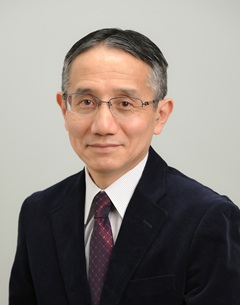
April 2025
Yoshihiro Sakoda
Dean, Faculty of Veterinary Medicine
Faculty Organization Leading Global Education and Research in Veterinary Science
I have been appointed as the Dean of the Faculty of Veterinary Medicine in April 2025. Thank you for visiting our website.
In April 2017, the former Graduate School of Veterinary Medicine was reorganized into the Faculty of Veterinary Medicine, a research organization to which faculty members belong, and the Graduate School of Veterinary Medicine and the Graduate School of Infectious Diseases, which are educational organizations. This was the third major reorganization following the establishment of the School of Veterinary Medicine in 1952 and the improvement of graduate school education in 1995. The aim of this third reorganization is to flexibly build an educational organization that promotes research and human resource development to meet the needs of the times and society.
The teaching staff belonging to the Faculty of Veterinary Medicine are involved in education at the Graduate School of Infectious Diseases and the Graduate School of Veterinary Medicine. At the Graduate School of Infectious Diseases, members of the Faculty of Veterinary Medicine who specialize in infectious disease research and teaching staff of the International Institute for Zoonosis Control, Institute for Genetic Medicine, and Institute for Vaccine Research and Development collaborate to provide graduate education focused on infectious diseases. The reorganized Graduate School of Veterinary Medicine is taking over the education provided by the former Graduate School of Veterinary Medicine. The two graduate schools that were launched in academic 2017 based on the education programs in the "Fostering Global Leaders in Veterinary Science toward Contributing to One Health", a Program for Leading Graduate Schools (academic 2011 - 2017) and the "Hokkaido University WISE Program for One Health Frontier Graduate School of Excellence", a Doctoral Program for World-leading Innovative & Smart Education (academic 2018 - 2024). We are encouraging PhD graduates with practical applied skills, problem-solving abilities, and the capacity to see the whole picture from a higher point of view, who can contribute to the development of global veterinary science and the control of infectious diseases. For details on education at both graduate schools, please see their websites. At the School of Veterinary Medicine, education is provided by the teaching staff of the Faculty of Veterinary Medicine. For details on undergraduate education, please visit the school’s website.
The Faculty of Veterinary Medicine retains a passion/aspiration for academic research that originates in research on chemical carcinogenesis, which was discovered 100 years ago by Dr. Koichi Ichikawa and Professor Katsusaburo Yamagiwa, who were candidates for the Nobel Prize in Physiology or Medicine in 1926. In the field of zoonosis, one of the specialties at Hokkaido University, world-leading research is promoted, including global-scale etiology/epidemiology research, analysis of host-parasite interaction and the development of diagnostic and treatment methods. Advanced veterinary research is conducted at the Veterinary Teaching Hospital, which boasts the most advanced facilities in Asia. Fieldwork is the faculty's forte, and research on environmental toxicity and wildlife/ecosystem conservation is conducted on a global scale. Moreover, the faculty contributes to the clarification of new life phenomena and the development of pharmaceutical products through research on life science using the characteristic approach of examining living organisms from the perspective of veterinary science. It is our great pleasure for us to promote these diverse research activities with excellent graduate students from Japan and a dozen other countries.
We intend to play an active role as the front runner of veterinary research by promoting basic research as intellectual creation based on unhindered thinking, technological development, applied research and development aimed at the resolution of social issues, and social contribution through the social implementation of research achievements. We also intend to focus on education research to produce veterinarian scientists in the next generation. Further support and guidance from those concerned will be greatly appreciated.
